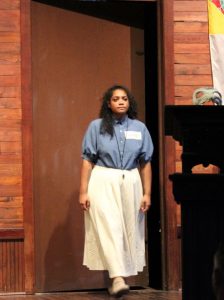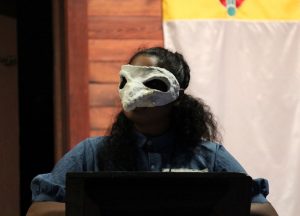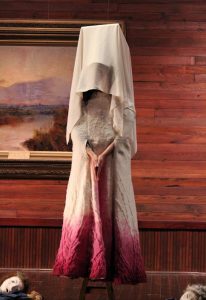3’s powerful amperage testament to Brock’s existential writing, Brady’s inspired direction
 Taking to the stage again tonight (and next Friday and Saturday nights as well) is 3. Performed in Art Hall at Koreshan State Park in Estero, 3 may be Ghostbird Theatre Company’s most powerful metaphorical offering to date.
Taking to the stage again tonight (and next Friday and Saturday nights as well) is 3. Performed in Art Hall at Koreshan State Park in Estero, 3 may be Ghostbird Theatre Company’s most powerful metaphorical offering to date.
Ghostbird has built a formidable reputation that extends well beyond Southwest Florida for edgy, out-of-the-box experimental theater, but the amperage turned up by Ghostbird in this new piece is a testament to the existential craftsmanship of playwright and Ghostbird co-founder Jim Brock, the inspired direction  of CalArts MSA candidate and Ghostbird co-founder Brittney Brady, spirited acting, and the intuitive genius of artist and dress designer MariaPia Malerba.
of CalArts MSA candidate and Ghostbird co-founder Brittney Brady, spirited acting, and the intuitive genius of artist and dress designer MariaPia Malerba.
The play centers around three incarcerated women who are undergoing a patriarchal “correction” that is both witnessed and supported by the community. “Yes, they do bad things, but they just need a little correction,” says the  Attendant haughtily in the scene’s opening monologue. “A little stick about, and they turn out just fine. Just like you or me.”
Attendant haughtily in the scene’s opening monologue. “A little stick about, and they turn out just fine. Just like you or me.”
It’s a concept that is explored in depth by Cornell Professor of Philosophy Kate Manne in her controversial book Down Girl: The Logic of Misogyny (Oxford Press, 2018).
Manne defines the latter term as ingrained cultural hostility toward women who violate patriarchal norms and expectations because they are not serving male interests in the way society expects them to.
“There’s this sense  that women are doing something wrong: that they’re morally objectionable or have a bad attitude or they’re abrasive or shrill or too pushy,” Manne explained in a 2018 interview with Sean Illing of Vox Magazine. “But women only appear that way because we expect them to be otherwise, to be passive.”
that women are doing something wrong: that they’re morally objectionable or have a bad attitude or they’re abrasive or shrill or too pushy,” Manne explained in a 2018 interview with Sean Illing of Vox Magazine. “But women only appear that way because we expect them to be otherwise, to be passive.”
According to Manne’s analysis, misogyny is the enforcement mechanism of patriarchal society that punishes women who transgress or threaten dominant men. This is precisely the jumping off point for 3. “The play considers how [women] internalize those [patriarchal, misogynistic corrections] and how we lose our humanity along the way,” says Brock.
to Manne’s analysis, misogyny is the enforcement mechanism of patriarchal society that punishes women who transgress or threaten dominant men. This is precisely the jumping off point for 3. “The play considers how [women] internalize those [patriarchal, misogynistic corrections] and how we lose our humanity along the way,” says Brock.
 But while the play explicates the ways in which men and society at large seek to keep women in check through socialization, peer pressure, humiliation and degradation, there’s not a male to be found in Director Brittney Brady’s cast! Oh, there are male characters in 3, to be sure. But in a sheer stroke directorial moxie, Brady has actors
But while the play explicates the ways in which men and society at large seek to keep women in check through socialization, peer pressure, humiliation and degradation, there’s not a male to be found in Director Brittney Brady’s cast! Oh, there are male characters in 3, to be sure. But in a sheer stroke directorial moxie, Brady has actors  Kaleena Rivera and Gabby Kadoo portray the play’s two male guards by donning beaklike masks that appropriately conjure images of falcons, hawks or eagles. (Brock, after all, teaches English at FGCU and Brady is an FGCU alum. Go Eagles!)
Kaleena Rivera and Gabby Kadoo portray the play’s two male guards by donning beaklike masks that appropriately conjure images of falcons, hawks or eagles. (Brock, after all, teaches English at FGCU and Brady is an FGCU alum. Go Eagles!)
Or perhaps the buzzard would be a more apt comparison.
Lest you believe that when it comes to misogynistic corrections, it strictly men versus women, societal backlash is characteristically embraced and supported by women operating under the belief that it is their place to defend and support, rather than challenge, male authority figures and the men in their lives.
And to  underscore this salient sociological observation, Brady and company employ yet another brilliant metaphorical device. The three women who are being punished throughout the play, Mun (Kaleena Rivera), Cal (Violet Shindler) and Alea (Katelyn Gravel) interact with each other and the audience exclusively through (wait for it) puppets that were designed and fabricated by Ghostbird playwright
underscore this salient sociological observation, Brady and company employ yet another brilliant metaphorical device. The three women who are being punished throughout the play, Mun (Kaleena Rivera), Cal (Violet Shindler) and Alea (Katelyn Gravel) interact with each other and the audience exclusively through (wait for it) puppets that were designed and fabricated by Ghostbird playwright  and FGCU Theatre Professor Barry Cavin and Ghostbird House Manager (and all-around best mom) Liz Gravel.
and FGCU Theatre Professor Barry Cavin and Ghostbird House Manager (and all-around best mom) Liz Gravel.
It is poignant and powerful imagery to be sure.
And so are the words that Brock places in Mun’s mouth.
“At some point, we generally cave into it, acquiesce, buy the script” Mun confesses with chagrin in the play’s penultimate scene. “We need no guards. We need no prisons. No bars. We place ourselves in the stocks, in the pillories. At first it’s embarrassing, a humiliation. But after a few hours of being called a whore-bitch-witch … after being told all you need is a good fuck, after being prodded, touched, you simply bend.”
Women have to come to terms with this forcible rape-like socialization Down Girl author Kate Manne readily acknowledges.
“Women cannot — and should not — internalize patriarchal values and give and give and give until we’re nothing,” Manne asserts, ringing the clarion bell. But at the same time, she concedes that she doesn’t know how expunge sexism and misogyny from our current culture.
Brock and Brady suggest that recognizing the problem is a crucial first step.
“I have committed atrocities against the state, the kingdom, the constitution, the public, nature and God,” Mun continues. “I have committed atrocities against myself. Worse, I have betrayed my kind.”
As with all of Ghostbird’s productions, 3 is packed with metaphors, similes, analogies and actions and dialogue subject to multi-layered and multi-tiered interpretation. There are scenes that implicate #MeToo; male-dominated society’s preoccupation with placing a high value on goods and services that cater to men and male interests; the role that religion plays in establishing and maintaining male dominance (“the invisible hand of God at my throat, over may mouth”) and our obsession with fashion fit only for those women who are lucky enough to have the body of a dancer (“we don’t get to choose the models”).
But for as sad, somber and heavy as the play can be at times, Brady carefully injects some much needed humor. It comes in a scene in which two dress designers, Gogo and Didi, discuss the design and fabrication of a garment called the “impossible dress.” Brady once again has Gogo and Didi interact with each other and the audience through the theatrical device of puppetry, but this time she substitutes hand puppets for Dunham-esque marionettes used in the play’s earlier (and later) scenes.
Under the best of circumstances, playing a role in a Ghostbird production is an arduous task because of the densely-packed themes and surreal characters typically employed by the likes of Jim Brock and Barry Cavin. Yet, Kaleena Rivera (Mun/Guard/Gogo), Violet Shindler (Cal/Didi), Katelyn Gravel (Alea) and Gabby Kadoo (Guard) pull off the feat with sensitivity, equanimity and enthusiasm. It’s pure joy to watch them work.
Finally, attention must be drawn to the role of artist and dress designer MariaPia Malerba. It fell upon MariaPia to conceive, cut and stitch together the “impossible dress.” In typical Ghostbird fashion, neither Brock nor Brady gave her much direction about what they wanted the impossible dress to be. In fact, they didn’t even provide her with the script. So all she had to go on was her own intuition and creative genius. And she came up Aces, designing a dress that appropriately objectified and constricted the wearer – just as women who adopt patriarchal thinking and values are themselves objectified and constricted.
As is true of the actual bird from the company takes its name, Ghostbird productions are rare, rarified and beautiful to behold. 3 is no exception. Make a point to see this show.














 Tom Hall is both an amateur artist and aspiring novelist who writes art quest thrillers. He is in the final stages of completing his debut novel titled "Art Detective," a story that fictionalizes the discovery of the fabled billion-dollar Impressionist collection of Parisian art dealer Josse Bernheim-Jeune, thought by many to have perished during World War II when the collection's hiding place, Castle de Rastignac in southern France, was destroyed by the Wehrmacht in reprisal for attacks made by members of the Resistance operating in the area. A former tax attorney, Tom holds a bachelor's degree as well as both a juris doctorate and masters of laws in taxation from the University of Florida. Tom lives in Estero, Florida with his fiancee, Connie, and their four cats.
Tom Hall is both an amateur artist and aspiring novelist who writes art quest thrillers. He is in the final stages of completing his debut novel titled "Art Detective," a story that fictionalizes the discovery of the fabled billion-dollar Impressionist collection of Parisian art dealer Josse Bernheim-Jeune, thought by many to have perished during World War II when the collection's hiding place, Castle de Rastignac in southern France, was destroyed by the Wehrmacht in reprisal for attacks made by members of the Resistance operating in the area. A former tax attorney, Tom holds a bachelor's degree as well as both a juris doctorate and masters of laws in taxation from the University of Florida. Tom lives in Estero, Florida with his fiancee, Connie, and their four cats.